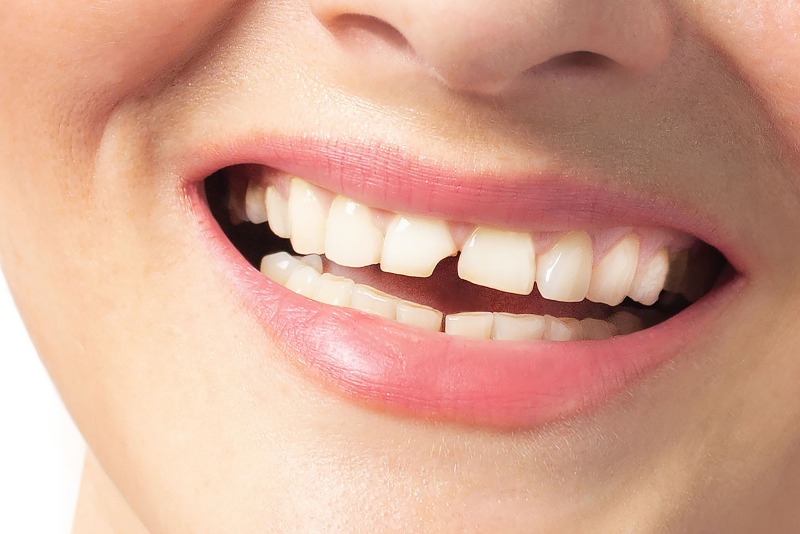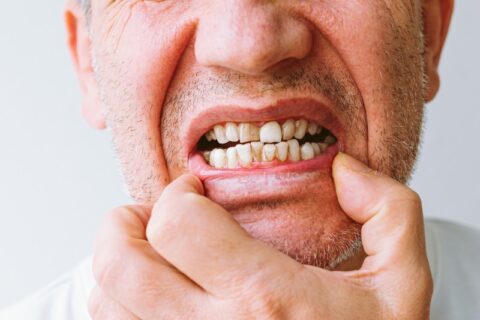Common Causes of Cracked Teeth and How to Prevent Them
At Matthew J. Cavendish, DDS, we understand that cracked front teeth can cause discomfort, sensitivity, and long-term dental issues if not treated. Whether it’s a small hairline crack or a severe fracture, cracked teeth should never be ignored. If left untreated, they can worsen over time, leading to pain, infection, and even tooth loss. The good news is that understanding the causes of cracked teeth and taking preventive measures can help fix cracked teeth.

Common Causes of Cracked Teeth
Understanding the factors that contribute to cracked teeth is essential for prevention:
- Teeth Grinding (Bruxism) – Habitual grinding or clenching, often during sleep, can exert excessive pressure on teeth, leading to cracks.
- Chewing on Hard Foods – Consuming hard items like ice, hard candies, or unpopped popcorn kernels can cause teeth to crack.
- Poor Oral Hygiene – Neglecting oral care can result in cavities, which weaken teeth and make them more susceptible to cracking.
- Sports or Accidental Injuries – Trauma from contact sports or accidents can lead to cracked teeth.
- Cavities and Tooth Decay – Decay undermines tooth structure, increasing the risk of fractures.
- Bruised Teeth and Jaw Injury – Injuries to the jaw can transfer force to teeth, causing cracks.
- Extreme Temperature Changes & Acidic Drinks/Foods – Sudden temperature shifts, such as consuming hot beverages followed by cold ones, can cause teeth to expand and contract, leading to cracks. Acidic foods and drinks can erode enamel, making teeth more vulnerable.
- Age (Wear & Tear) – Over time, the wear and tear from years of chewing can lead to cracks, especially in individuals over 50.
- Inadequate Dental Treatment – Procedures like large fillings or root canals without proper restoration can weaken teeth, increasing the likelihood of cracks.
- Smoking – Tobacco use can contribute to gum disease and tooth decay, both of which can weaken teeth and lead to cracks.
Treatment Options for Cracked Teeth
- Dental Crowns – A custom crown covers and protects a cracked tooth, restoring its strength and function.
- Dental Veneers – Thin porcelain shells can hide minor cracks and improve the appearance of front teeth.
- Dental Implants – If a tooth is severely damaged and cannot be saved, an implant replaces the lost tooth.
- Root Canal Therapy – If a crack extends into the pulp, a root canal removes the damaged tissue and saves the tooth.
- Dental Bonding – For minor cracks, a tooth-colored resin is applied to restore the tooth’s structure.
Preventing Cracked Teeth
Prevention is the best way to keep your teeth healthy and strong. Follow these simple steps to reduce your risk of cracked teeth:
- Wear a Mouthguard – If you grind your teeth or play contact sports, a custom mouthguard provides protection.
- Avoid Hard Foods – Be mindful of what you chew to prevent unnecessary stress on your teeth.
- Practice Good Oral Hygiene – Brush twice daily, floss, and visit the dentist regularly to prevent decay.
- Schedule Regular Dental Check-Ups – Routine exams catch early signs of cracks before they worsen.
- Limit Acidic and Sugary Foods – These can weaken enamel and make teeth more vulnerable.
- Quit Smoking – Tobacco weakens teeth and gums, increasing the risk of cracks and other dental issues.
Conclusion
Cracked teeth are a common dental issue, but with the right habits and professional care, they can be prevented and treated effectively. By understanding the causes, taking preventive measures, and seeking timely treatment, you can protect your teeth for years to come.
Visit Us for Expert Dental Care
At Matthew J. Cavendish, DDS, PLLC , we provide top-quality dental care in North Phoenix and Paradise Valley. Whether you need treatment for a cracked tooth or want to take preventive measures, our friendly team is here to help. Contact us to schedule an appointment for cracked teeth repair.


